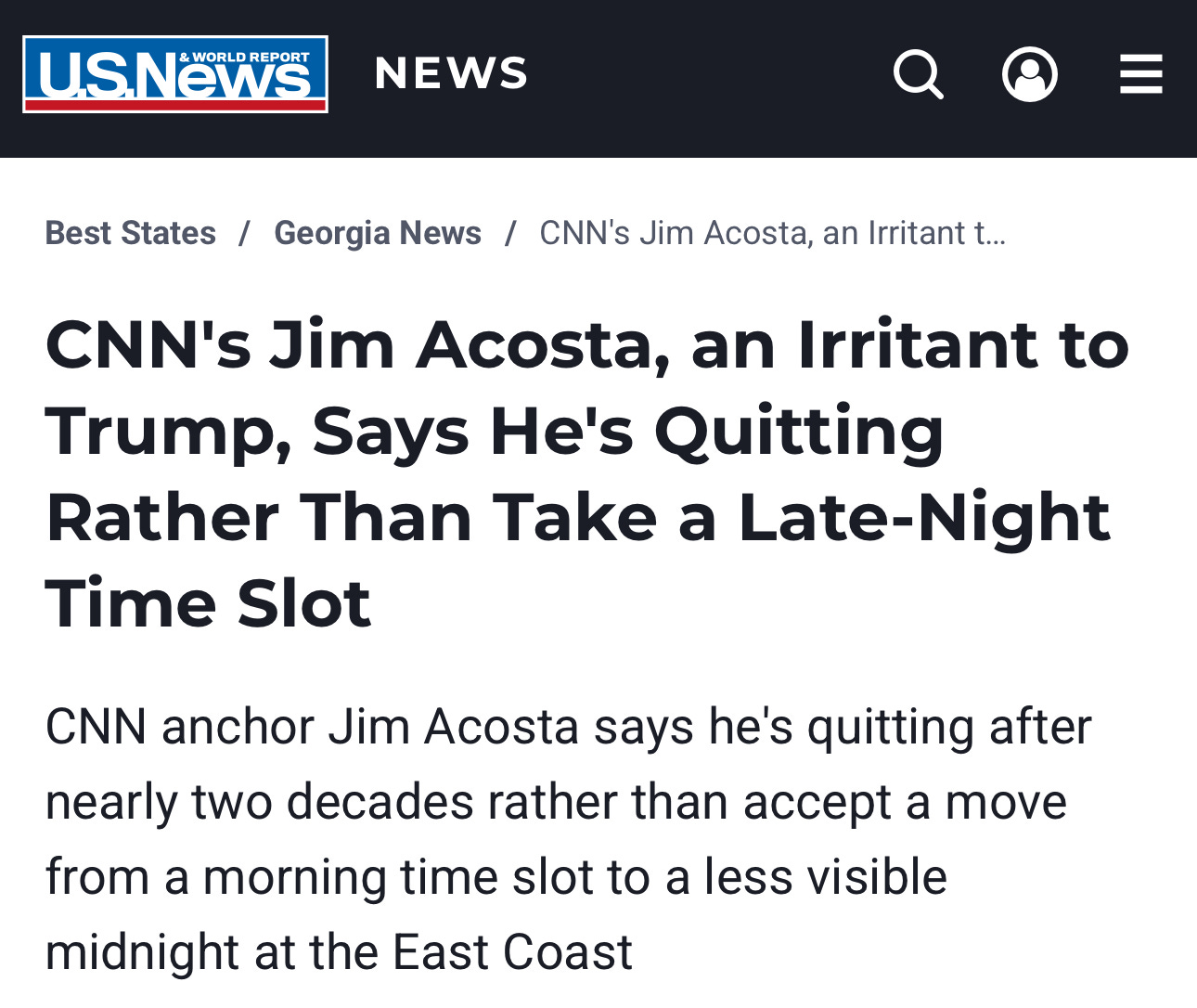When Journalism Bows to Power
As major news outlets retreat under authoritarian pressure, independent journalists are stepping up. Will the national press find its way before it's too late?
In the flickering candle of American democracy, a troubling pattern has emerged: major media institutions, faced with authoritarian pressure, are choosing appeasement over accountability. Jim Acosta, one of Trump's most prominent critics at CNN, has joined the growing exodus of veteran journalists striking out on their own rather than accept institutional constraints on their truth-telling.
CNN had planned to sideline Acosta to a midnight slot – far from the prime-time spotlight where his questioning could make the most impact. Instead, he chose independence. It's a powerful reminder: when established media retreats, independent journalism becomes our last line of defense.
The Price of Appeasement
The stark reality of media suppression is no longer theoretical. In a sweeping move that signals what's to come, the Trump administration has ordered the removal of four major news outlets – The New York Times, NBC News, NPR, and Politico – from their dedicated office spaces at the Pentagon. Their replacements? Primarily right-wing outlets, including The New York Post, One America News Network (OANN), and Breitbart News, under the thin veneer of a "new annual media rotation program."
This institutional purge of respected news organizations, scheduled for February 2025, is just the beginning. In a wide-ranging conversation with NPR’s Eric Deggans on Inauguration Day, we discussed the stark truths emerging about the state of American journalism. Media outlets, hoping to avoid controversy and maintain access, are increasingly self-censoring and sidelining their most outspoken voices. Yet history shows that this strategy of accommodation ultimately fails to protect journalistic independence.
"There's a lot of concern both about what he might do and also about what established media outlets might curtail what they're doing in advance to avoid incurring attention or criticism," Deggans notes, pointing to a chilling effect already taking hold across newsrooms.
The Pentagon press corps changes prove these fears weren't unfounded – they were prescient.
Listen to the full interview here:
The Rise of Independent Media
As traditional outlets falter, we're witnessing a crucial shift. Talented journalists are increasingly breaking free from institutional constraints, launching independent platforms where they can speak truth without fear of corporate reprisal. From Substack newsletters to nonprofit newsrooms like ProPublica, these independent voices are becoming essential guardians of democratic discourse.
The exodus is sweeping across major outlets. At CNN, Jim Acosta's departure follows a pattern of prominent journalists choosing independence over institutional compromise. At The Washington Post, concerns about editorial independence have prompted several high-profile departures. At various other mainstream outlets, experienced journalists are making similar choices. These veterans aren't leaving journalism – they're reinventing it, creating new models that prioritize truth over access and courage over comfort.
The Erosion of Local News
This transformation comes at a critical moment. The landscape of American journalism has been hollowed out, with local newsrooms decimated and consolidated under corporate ownership. Where cities once had competing newspapers and TV stations with dedicated beat reporters covering every aspect of civic life, we now see skeleton crews struggling to maintain basic coverage.
As Deggans explains, "What's changed for the average news consumer is that they have access to more platforms, but those platforms have less original content when it comes to local news, especially."
Beyond Traditional Models
The crisis in traditional media has sparked innovation in funding models. Nonprofit journalism hubs like ProPublica and the Marshall Project are demonstrating that fearless investigative reporting can thrive outside the commercial model. Meanwhile, independent journalists are building direct relationships with readers through subscription-based platforms, freeing themselves from the pressures of advertising and corporate ownership.
These new models aren't just alternatives to traditional media – they're increasingly the front line of democratic defense. When major outlets pull their punches, independent journalists can step in to fill the accountability gap.
The False Promise of Balance
Perhaps most troublingly, in their attempt to appear "neutral," many mainstream outlets have normalized the abnormal. When faced with deliberate disinformation campaigns, the traditional journalistic approach of "both sides" reporting can actually serve to amplify and legitimize false narratives.
The instinct to treat every claim as worthy of serious investigation rather than contextualizing it within a broader pattern of manipulation plays directly into the hands of those seeking to flood the zone with disinformation.
A Path Forward
The solution isn't simple, but it starts with supporting and strengthening independent journalism while demanding more from traditional outlets. The Pentagon press corps purge demonstrates why we can't rely solely on institutional access – when truth-telling becomes inconvenient, that access can vanish overnight. Some established media organizations are already showing what courage looks like. As Deggans points out, "The Atlantic is staffing up on its reporters. It did a whole issue devoted to why Trump shouldn't be president. And they haven't given any indication that they're going to change."
But individual acts of journalistic courage, while vital, aren't enough. We need to build and sustain new models that can support aggressive accountability journalism without making it hostage to commercial pressures or political intimidation. This means supporting independent journalists, funding nonprofit newsrooms, and creating sustainable platforms for truth-telling outside traditional power structures.
The stakes couldn't be higher. When media institutions choose appeasement over accountability, they don't just fail their professional mission – they fail democracy itself. And as the Jim Acosta situation reminds us, such compromises rarely buy anything more than a temporary reprieve.
In the end, there is no safe middle ground between truth and tyranny. Whether through traditional outlets finding their courage or independent journalists creating new platforms for truth-telling, American journalism must rise to this moment. The future of our democracy may depend on it.






❤️